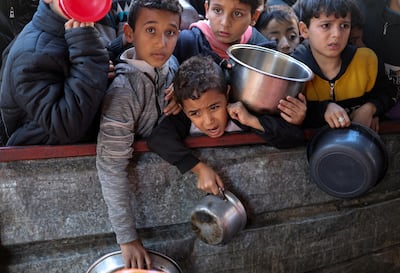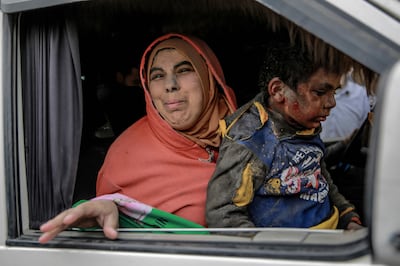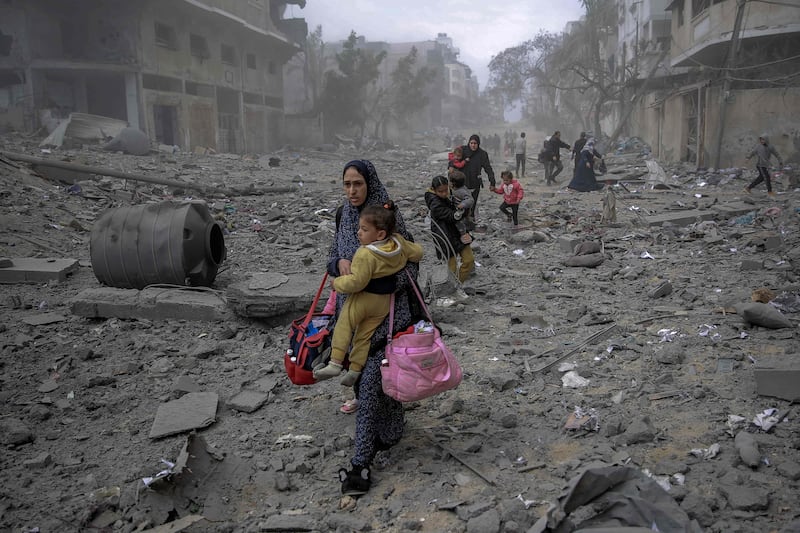Live updates: Follow the latest from Israel-Gaza
Negotiators met on Monday in Doha to try to bridge the remaining gaps between Hamas and Israel over the terms of a possible Gaza truce and a prisoner and hostage swap, sources familiar with the process told The National.
The negotiations are the latest bid in more than three months of talks between mediators from the US, Egypt and Qatar to broker a ceasefire in the five-month-old war.
The latest efforts follow the negotiators' failure to reach a truce before Ramadan, which began on March 11, despite considerable pressure from the US.
The sources said negotiators from Egypt, Qatar and Israel held lengthy discussions on Monday. The Egyptians and Qataris were due later to meet Hamas officials, led by political leader Ismail Haniyeh and Khalil Al Hayah, the deputy and confidante of Hamas’s powerful Gaza leader Yahya Sinwar.
The Mossad chief David Barnea and his counterpart at the domestic Shin Bet security agency, Ronen Bar, are already in Qatar. The CIA director William Burns and his Egyptian counterpart Abbas Kamel will arrive later on Monday, according to the sources.
No time frame was given for the duration of the talks, but the sources said they could last several days because the mediators wanted Hamas leaders in Gaza, who have been difficult to reach, to respond to questions and new proposals while the negotiating parties are still in Doha. In previous rounds of negotiations, Hamas's Gaza leadership has responded after in-person talks had concluded.
The Gaza-based Mr Sinwar and the senior commanders of the group's military wing, with whom he is close, are seen as having the final call on decisions. Mr Haniyeh and other leaders like Khaled Mashaal have lived in exile for years, losing much of the influence they once had within the group.
On the table in Doha are Hamas’s conditions for a ceasefire, which Israel has already dismissed as “unrealistic”, but is yet to issue a formal response to.
Mr Netanyahu has said that annihilating Hamas was the war’s main objective and that Israel wanted to retain an unqualified security role in Gaza after the war ends.
A proposed six-week truce will be discussed, during which Hamas wants to see the redeployment of Israeli forces outside urban centres and their departure from Gaza’s two main roads, Salaheddin and Al Rasheed, according to the sources.
That, Hamas argues, will facilitate the delivery of humanitarian assistance across Gaza and ensure the safety of the hundreds of thousands of residents displaced by the war as they gradually make their way home to central and northern Gaza.
Hamas also wants guarantees that a permanent ceasefire will be in place when the initial six-week truce ends.
Hamas says it is prepared to release 40 to 45 of the estimated 100 hostages it still holds during the initial six-week truce. The released will be women, ailing, elderly or children. In return, Israel must release at least 1,000 Palestinians incarcerated in its prisons.
It also wants humanitarian aid to freely flow into Gaza during the initial truce, including temporary homes and tent camps for Palestinians whose homes are destroyed or structurally damaged.

During the second phase of the deal, Hamas wants Israel to completely pull out of Gaza, a demand unlikely to be met by Mr Netanyahu’s government.
Hamas promises to release the female Israeli soldiers – believed to number five – that it is holding hostage in the second phase. In return, it wants Israel to release 50 Palestinian prisoners for each one of them. Each 50 should include 30 who are serving life or long jail terms in Israeli prisons, it says.
The third phase of the deal is open-ended. It will include a swap of active-duty Israeli soldiers in Hamas’s custody for Palestinian prisoners, whose number will be determined later.
The deal also involves Hamas allowing the examination of the remains of an estimated 30 hostages who died while in Hamas’s captivity by independent forensic experts to determine their identities, before they are handed to Israel, also in exchange for Palestinian prisoners.

The meetings in Qatar are taking on added urgency because of the rapidly worsening humanitarian situation in Gaza, where famine is expected between now and May in the enclave’s north.
The number of people facing “catastrophic hunger” in Gaza has risen to 1.1 million – about half the territory’s population of 2.3 million – according to a UN-backed report by the Integrated Food Security Phase Classification published on Monday.
The threat of a potentially disastrous ground operation by Israel in the southern city of Rafah is also lending added urgency to the talks. Mr Netanyahu reaffirmed on Sunday that Israeli forces intend to invade Rafah, which is located on the Egyptian border and is now home to some 1.5 million displaced Palestinians.
The Gaza war was triggered by a deadly rampage on October 7 by Hamas in southern Israel that left around 1,200 people dead and around 240 more kidnapped and taken to Gaza as hostages. The attack triggered a relentless military campaign by Israel that has to date killed more than 31,700 Palestinians, wounded more than twice as many and displaced most of the enclave’s residents.
During a week-long truce in late November, Hamas released more than 100 hostages, leaving it with about 130. At least 30 of these are believed to have died in captivity as a result of Israel’s bombardment.







